- Serbia
Get to know Serbia
- Citizens
Culture and science
Health services
Pension and disability insurance
- Business
Employment
Economy
- Media
- Government
- Contact
Keep in touch
Contact form
Back
Keepin touch
Whether you have a question, comment, suggestion or any problem in the purview of the government, send us your message and we will try to respond as soon as possible. If your problem is not in our purview, we will forward your message to the relevant institution.
Q:
A:
Deputy Prime Minister Labus, European Commission Western Balkans Director Priebe discuss Serbia’s reforms, EU integration
Belgrade,
29 April 2004
Serbian Deputy Prime Minister Miroljub Labus met today with European Commission Director for Western Balkans Reinhard Priebe to discuss Serbia’s efforts to integrate into European institutions, the country’s economic situation, as well as economic harmonisation between Serbia and Montenegro.
Priebe, who is on a two-day visit to Belgrade for the fourth meeting between officials of the European Commission and Serbia-Montenegro as part of the Enhanced Permanent Dialogue, said that the implementation of the Action Plan for economic harmonisation between Serbia and Montenegro, and the state union’s cooperation with the Hague tribunal, are the preconditions for drawing up a feasibility study for signing a Stabilization and Association Agreement with the European Union.
The two officials discussed Serbia’s progress in resolving sugar export problems and meeting the necessary requirements for a bilateral agreement on textile.
Labus also focused on the government’s efforts to help harmonise economic relations between Serbia and Montenegro, and meet the European Partnership priorities.
European Commission officials have welcomed Serbia’s recent agreement with the International Monetary Fund (IMF), seen as a precondition for EU’s macrofinancial assistance, and said that an ECFIN delegation will visit Belgrade in late May to finalise the macrofinancial arrangement.
Labus said that the government has forwarded a series of economic bills for parliament approval. Stressing that the parliament will debate 12 key reform bills in May, the Deputy Prime Minister said that the government is determined to continue with economic reforms and integrate into European institutions.
Priebe said he expects Belgrade and Pristina to resume open dialogue as part of the “standards before status” policy.
According to Labus, the Serbian government is not opposed to dialogue resumption but believes that a substantial progress in relations between Belgrade and Pristina calls for the two sides to open talks on territorial autonomy. The territorial autonomy proposal is in line with the Plan for a political solution to the current situation in Kosovo-Metohija which the Serbian parliament unanimously adopted at a session today, the Deputy Prime Minister added.
The two officials discussed Serbia’s progress in resolving sugar export problems and meeting the necessary requirements for a bilateral agreement on textile.
Labus also focused on the government’s efforts to help harmonise economic relations between Serbia and Montenegro, and meet the European Partnership priorities.
European Commission officials have welcomed Serbia’s recent agreement with the International Monetary Fund (IMF), seen as a precondition for EU’s macrofinancial assistance, and said that an ECFIN delegation will visit Belgrade in late May to finalise the macrofinancial arrangement.
Labus said that the government has forwarded a series of economic bills for parliament approval. Stressing that the parliament will debate 12 key reform bills in May, the Deputy Prime Minister said that the government is determined to continue with economic reforms and integrate into European institutions.
Priebe said he expects Belgrade and Pristina to resume open dialogue as part of the “standards before status” policy.
According to Labus, the Serbian government is not opposed to dialogue resumption but believes that a substantial progress in relations between Belgrade and Pristina calls for the two sides to open talks on territorial autonomy. The territorial autonomy proposal is in line with the Plan for a political solution to the current situation in Kosovo-Metohija which the Serbian parliament unanimously adopted at a session today, the Deputy Prime Minister added.
-
 Belgrade, 11 February 2026
Belgrade, 11 February 2026Ample space for advancing cooperation with Ukraine in field of education
-
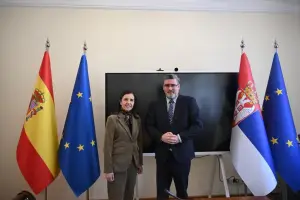 Belgrade, 11 February 2026
Belgrade, 11 February 2026Spain’s support for Serbia’s European path
-
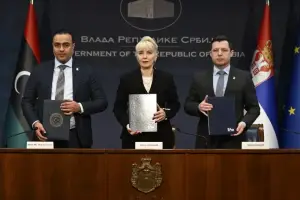 Belgrade, 10 February 2026
Belgrade, 10 February 2026Libya’s participation in Expo 2027 confirms strong bilateral relations
-
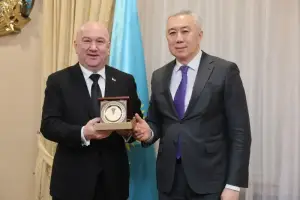 Belgrade/Astana, 10 February 2026
Belgrade/Astana, 10 February 2026Potential for advancing cooperation with Kazakhstan in multiple sectors
-
 Belgrade, 10 February 2026
Belgrade, 10 February 2026Serbia fully committed to implementation of reforms
-
 Belgrade, 9 February 2026
Belgrade, 9 February 2026Partnership with Romania in solving issues of importance to citizens
-
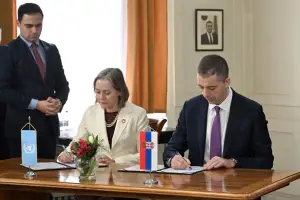 Belgrade, 9 February 2026
Belgrade, 9 February 2026UN-Republic of Serbia Sustainable Development Cooperation Framework 2026-2030 signed
-
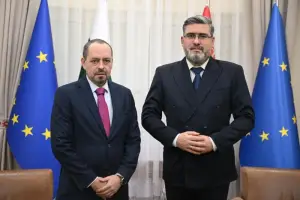 Belgrade, 9 February 2026
Belgrade, 9 February 2026Support of neighbouring countries of great importance for Serbia’s European integration process
-
 Belgrade, 7 February 2026
Belgrade, 7 February 2026Solid foundations for long-term, systemic development of beekeeping laid
-
 Belgrade/Brussels, 6 February 2026
Belgrade/Brussels, 6 February 2026Serbia's full readiness to cooperate with EC to accelerate reform implementation

